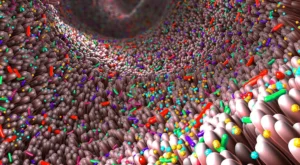By Ross Pelton, RPh, PhD, CCN
A landmark paper just published (Sept. 2018) reported that people who take probiotics regularly were 29% less likely to be prescribed a prescription for antibiotics. This is an extremely important paper because of the current global health crises caused by the rapid increase in antibiotic-resistant ‘Superbug’ bacterial infections.
The title of this study is, ”Does probiotic consumption reduce antibiotic utilization for common acute infections? A systematic review and meta-analysis.” The researchers evaluated data on probiotic and antibiotic use from 12 previously conducted studies. The pooled results revealed that infants and children were 29% percent less likely to have been prescribed antibiotics if they had been taking probiotic supplements. Strains of Lactobacillus and Bifidobacterium were the most frequently used probiotics used in these studies. The researchers noted that this percentage of children who did not take antibiotics was increased to 53% when only the highest quality studies were factored.
Lead investigator Daniel Merenstein, MD stated, “We already have evidence that consuming probiotics reduces the incidence, duration, and severity of certain types of common acute respiratory and gastrointestinal infections.” The authors of the study concluded by saying, “Although the exact mechanisms through which probiotics help infight infections remain unclear, some possibilities include immune regulation and the production of pathogen inhibitors.”
From my perspective as Scientific Director at Essential Formulas, I want to suggest that scientists are beginning to gain a greater understanding of how probiotic bacteria fight infections and how they support immune health, which ultimately protects people from getting infections. The answer is explained by the term POSTBIOTIC METABOLITES.
Postbiotic metabolites are compounds that probiotic bacteria make when they digest or ferment fiber-rich foods in your intestinal tract. As scientists continue to decipher the ‘microbiome puzzle’ they are learning that probiotic bacteria produce thousands (maybe hundreds of thousands) of compounds that play critical roles or perform vital functions that regulate, either directly or indirectly, virtually everything that happens in our body.
Consequently, postbiotic metabolites are the new frontier in microbiome science. We are just beginning to learn about the many ways these postbiotic metabolites function to maintain a healthy microbiome ecosystem in the human gastrointestinal tract. The greater the diversity in your microbiome equates to better health. Greater microbiome diversity means your GI tract is home to a wide range of different types of bacteria, which in turn, results in the production of a wider range of heath-regulating postbiotic metabolites. It is equally important for people to understand that ONLY WAY to create and maintain a diverse microbiome is to consume a widely diverse range of fiber-rich foods, especially multi-colored vegetables. Different types of fibers support the growth of different types of probiotic bacteria.
So, the secret is in your diet. It is not enough to take probiotics. You have to learn how to feed your probiotic bacteria well; otherwise they will not thrive and survive. My recommendation for a healthy microbiome is to take two capsules of Dr. Ohhira’s Probiotics daily AND consume a wide range of fiber-rich foods every day.
Now, in closing, I want to ask, “How serious is the problem of antibiotic-resistant bacteria?” The problem is being called “a major threat to mankind” and some experts are predicting that antibiotic-resistant ‘Superbug’ infections will become a greater threat than cancer by the year 2050. England’s chief medical officer has warned that humanity is facing a situation where antibiotic resistance can turn common ailments into fatal diseases, creating what is being referred to as a potential ‘post-antibiotic apocalypse.’
The Centers for Disease Control and Prevention (CDC) published a comprehensive analysis of the problem in a report titled Antibiotic Resistance Threats in the United States, 2013, which listed 18 major antibiotic-resistant threats in the U.S. Currently least 2 million people get an antibiotic-resistant infection, and at least 23,000 people die.i Globally, about 700,000 people die annually due to antibiotic-resistant infections and experts project that if immediate measures are not taken, the rise in antibiotic-resistant ‘Superbug’ infections could be killing more than 10 million people a year by 2050.ii
The study I have reviewed here makes a very powerful statement because it shows that taking probiotic bacteria boosts immunity so that those individuals decrease their need for antibiotics.
We desperately need more bugs and fewer drugs. We need to rely more on good probiotic bacteria, and less on prescription antibiotic drugs. But, this requires making a major shift away from the Standard American Diet (SAD), which consists of processed foods that are high in sugars, bad fats and largely devoid of fibers. A healthy fiber-rich diet is required to maintain a healthy microbiome so that your probiotic bacteria can produce a wide range of postbiotic metabolites to support and maintain your immune system and your health.




